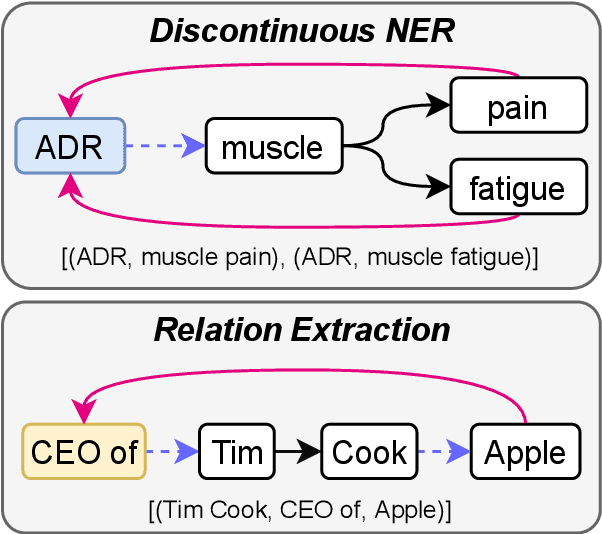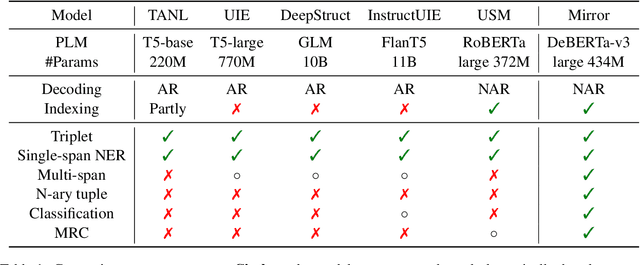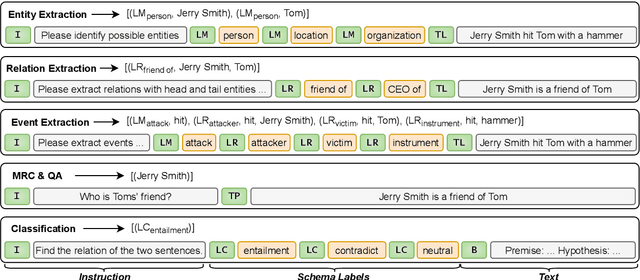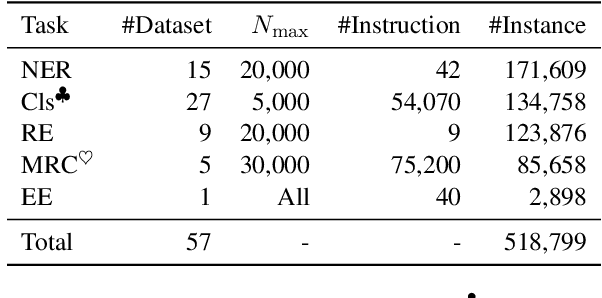Guoliang Zhang
Mirror: A Universal Framework for Various Information Extraction Tasks
Nov 26, 2023



Abstract:Sharing knowledge between information extraction tasks has always been a challenge due to the diverse data formats and task variations. Meanwhile, this divergence leads to information waste and increases difficulties in building complex applications in real scenarios. Recent studies often formulate IE tasks as a triplet extraction problem. However, such a paradigm does not support multi-span and n-ary extraction, leading to weak versatility. To this end, we reorganize IE problems into unified multi-slot tuples and propose a universal framework for various IE tasks, namely Mirror. Specifically, we recast existing IE tasks as a multi-span cyclic graph extraction problem and devise a non-autoregressive graph decoding algorithm to extract all spans in a single step. It is worth noting that this graph structure is incredibly versatile, and it supports not only complex IE tasks, but also machine reading comprehension and classification tasks. We manually construct a corpus containing 57 datasets for model pretraining, and conduct experiments on 30 datasets across 8 downstream tasks. The experimental results demonstrate that our model has decent compatibility and outperforms or reaches competitive performance with SOTA systems under few-shot and zero-shot settings. The code, model weights, and pretraining corpus are available at https://github.com/Spico197/Mirror .
CED: Catalog Extraction from Documents
Apr 28, 2023



Abstract:Sentence-by-sentence information extraction from long documents is an exhausting and error-prone task. As the indicator of document skeleton, catalogs naturally chunk documents into segments and provide informative cascade semantics, which can help to reduce the search space. Despite their usefulness, catalogs are hard to be extracted without the assist from external knowledge. For documents that adhere to a specific template, regular expressions are practical to extract catalogs. However, handcrafted heuristics are not applicable when processing documents from different sources with diverse formats. To address this problem, we build a large manually annotated corpus, which is the first dataset for the Catalog Extraction from Documents (CED) task. Based on this corpus, we propose a transition-based framework for parsing documents into catalog trees. The experimental results demonstrate that our proposed method outperforms baseline systems and shows a good ability to transfer. We believe the CED task could fill the gap between raw text segments and information extraction tasks on extremely long documents. Data and code are available at \url{https://github.com/Spico197/CatalogExtraction}
 Add to Chrome
Add to Chrome Add to Firefox
Add to Firefox Add to Edge
Add to Edge